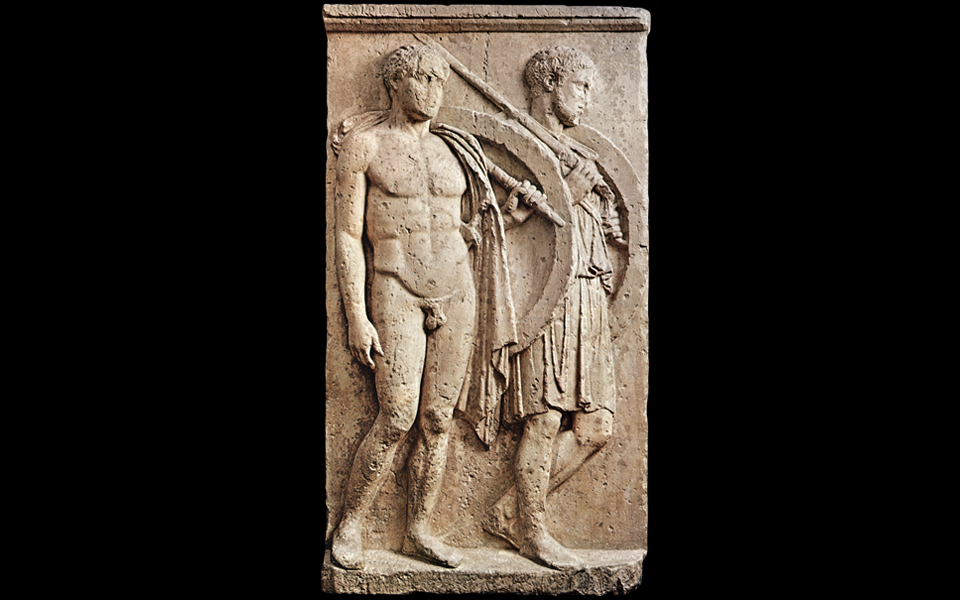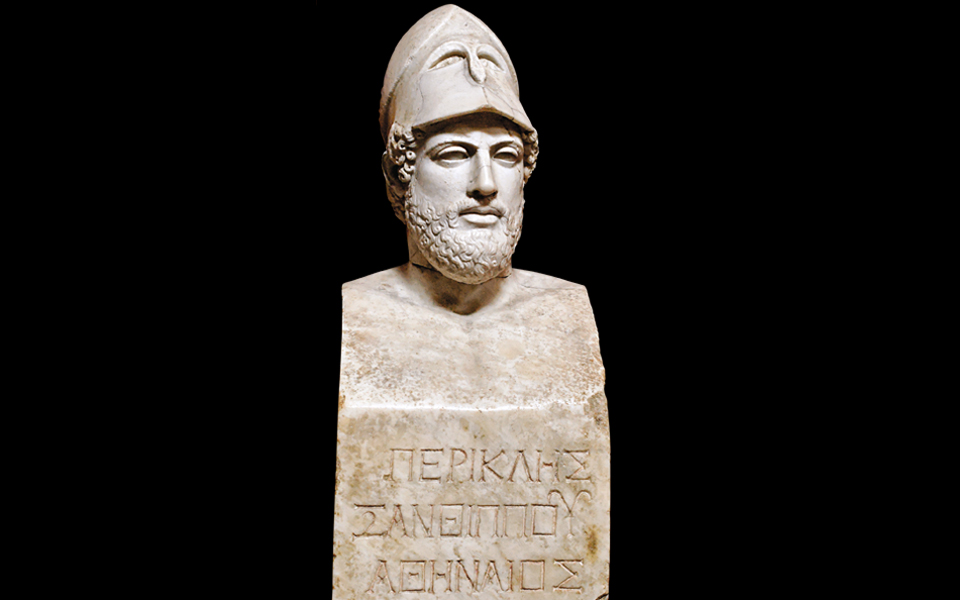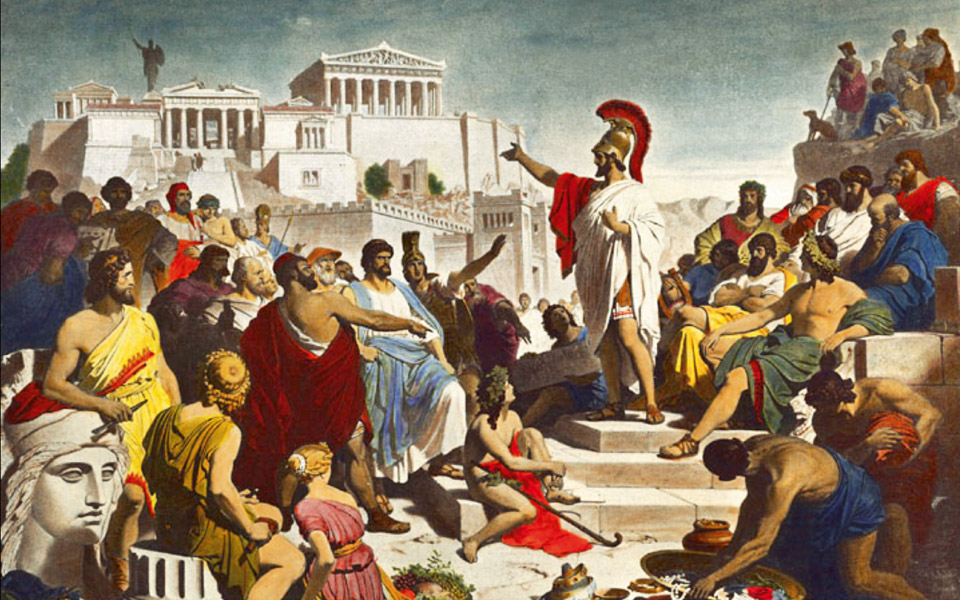“Our constitution does not copy the laws of neighboring states; we are rather a pattern to others than imitators ourselves. Its administration favors the many instead of the few; this is why it is called a democracy. If we look to the laws, they afford equal justice to all in their private differences; if to social standing, advancement in public life falls to reputation for capacity, class considerations not being allowed to interfere with merit; nor again does poverty bar the way, if a man is able to serve the state, he is not hindered by the obscurity of his condition.
The freedom which we enjoy in our government extends also to our ordinary life. There, far from exercising a jealous surveillance over each other, we do not feel called upon to be angry with our neighbor for doing what he likes, or even to indulge in those injurious looks which cannot fail to be offensive, although they inflict no positive penalty. But all this ease in our private relations does not make us lawless as citizens. Against this fear is our chief safeguard, teaching us to obey the magistrates and the laws, particularly such as regard the protection of the injured, whether they are actually on the statute book, or belong to that code which, although unwritten, yet cannot be broken without acknowledged disgrace.
Further, we provide plenty of means for the mind to refresh itself from business. We celebrate games and sacrifices all the year round, and the elegance of our private establishments forms a daily source of pleasure and helps to banish the spleen; while the magnitude of our city draws the produce of the world into our harbor, so that to the Athenian the fruits of other countries are as familiar a luxury as those of his own.
“ We provide plenty of means for the mind to refresh itself from business. We celebrate games and sacrifices all the year round, and the elegance of our private establishments forms a daily source of pleasure and helps to banish the spleen; ”

“ Our public men have, besides politics, their private affairs to attend to, and our ordinary citizens, though occupied with the pursuits of industry, are still fair judges of public matters; ”
If we turn to our military policy, there also we differ from antagonists. We throw open our city to the world, and never by alien acts exclude foreigners from any opportunity of learning or observing, although the eyes of an enemy may occasionally profit by our liberality; trusting less in system and policy than to the native spirit of our citizens; while in education, where our rivals from their very cradles by a painful discipline seek after manliness, at Athens we live exactly as we please, and yet are just as ready to encounter every legitimate danger. In proof of this it may be noticed that the Lacedaemonians do not invade our country alone, but bring with them all their confederates; while we Athenians advance unsupported into the territory of a neighbor, and fighting upon a foreign soil usually vanquish with ease men who are defending their homes.
Our united force was never yet encountered by any enemy, because we have at once to attend to our marine and to dispatch our citizens by land upon a hundred different services; so that, wherever they engage with some such fraction of our strength, a success against a detachment is magnified into a victory over the nation, and a defeat into a reverse suffered at the hands of our entire people. And yet if with habits not of labor but of ease, and courage not of art but of nature, we are still willing to encounter danger, we have the double advantage of escaping the experience of hardships in anticipation and of facing them in the hour of need as fearlessly as those who are never free from them.
Nor are these the only points in which our city is worthy of admiration.

We cultivate refinement without extravagance and knowledge without effeminacy; wealth we employ more for use than for show, and place the real disgrace of poverty not in owning to the fact but in declining the struggle against it. Our public men have, besides politics, their private affairs to attend to, and our ordinary citizens, though occupied with the pursuits of industry, are still fair judges of public matters; for, unlike any other nation, regarding him who takes no part in these duties not as unambitious but as useless, we Athenians are able to judge at all events if we cannot originate, and instead of looking on discussion as a stumbling-block in the way of action, we think it an indispensable preliminary to any wise action at all.
Again, in our enterprises we present the singular spectacle of daring and deliberation, each carried to its highest point, and both united in the same persons; although usually decision is the fruit of ignorance, hesitation of reflection. But the palm of courage will surely be adjudged most justly to those, who best know the difference between hardship and pleasure and yet are never tempted to shrink from danger. In generosity we are equally singular, acquiring our friends by conferring not by receiving favors. Yet, of course, the doer of the favor is the firmer friend of the two, in order by continued kindness to keep the recipient in his debt; while the debtor feels less keenly from the very consciousness that the return he makes will be a payment, not a free gift. And it is only the Athenians who, fearless of consequences, confer their benefits not from calculations of expediency, but in the confidence of liberality.”
∗ Thucydides| “The History of the Peloponnesian War,” London, J.M. Dent; New York, E.P. Dutton. 1910.
INFO
The winter of 430 BC marked the end of the first year of the Peloponnesian War (431-404 BC). As was their custom, the Athenians buried the war dead at public expense and asked Pericles to deliver the funeral speech. This speech, a passionate hymn to the Athenian state and democracy, was recorded by the Athenian historian Thucydides (c. 460 – c. 400 BC) in the second book of his “History of the Peloponnesian War” (2.35 to 2.44).










